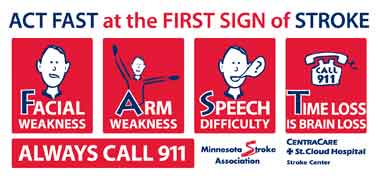May is Stroke Awareness Month
Stroke is a leading cause of serious, long-term disability and fifth for death in the United States, according to the American Stroke Association. Approximately 795,000 people experience a new or recurrent stroke each year, killing nearly 130,000 of them.
Strokes occur when a blood vessel carrying oxygen and vital nutrients to the brain is either blocked by a clot or ruptures. When this occurs, part of the brain is deprived of blood and oxygen, destroying millions of valuable nerve cells within minutes.
The resulting damage can lead to significant disability including paralysis, speech problems and emotional difficulties. Treatment may be available if you get to the emergency room immediately upon recognition of stroke symptoms. Unfortunately, only 25 percent of patients experiencing an acute stroke seek immediate medical treatment reports the article in the Journal of American Heart Association, “Reducing the Delay Between Stroke Onset and Hospital Arrival: Is It an Achievable Goal?”
Act FAST at the first sign of stroke. FAST stands for: Facial weakness, arm weakness, speech difficulties and T is for Time is brain — call 911.

Other stroke symptoms also may include:
- Sudden severe headache without known cause
- Sudden weakness or numbness, sometimes on one side of the body
- Sudden dizziness, difficulty walking, or loss of balance/coordination
- Sudden confusion and trouble speaking or understanding
- Sudden trouble seeing in one or both eyes
Stroke risk factors:
- High blood pressure
- Heavy alcohol use
- High cholesterol
- Physical inactivity and obesity
- Heart disease
- Atrial fibrillation (irregular heartbeat)
- Diabetes
- Family history of stroke
- Smoking
Leading a healthy lifestyle, including lowering risks factors like high blood pressure and weight, can also help reduce your stroke risk. For more information, visit Stroke Signs & Risk Factors.